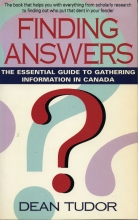
| Home News Releases | Calendar Contact |
Sources Bookshelf

Finding Answers
The Essential Guide to Gathering Information in Canada
Tudor, Dean
Publisher: McClelland & Stewart, Toronto, CanadaYear Published: 1993
Pages: 308pp Price: $19.99 ISBN: 0-7710-8637-7
Library of Congress Number: Z669.7.T84 1993 Dewey: 028.7'0971
Please see our media profile in Sources:
Sources Select Resources
"Why is there never enough time to do it right, but always enough time to do it over?" - Unknown
Can you relate to that? It's a quote from the last chapter of Finding Answers: Approaches to Gathering Information by Dean Tudor. His suggestion is first to browse this reference work rather than attempt to read the complete work, so as to minimize the risk of developing MEGO (my eyes glaze over), an acronym describing information overload.
The first three chapters are devoted to theory: The Nature of Information, The Triad of Information and the Linkage of Information. The focus in the first chapter is on discernment: What are facts, how accessible are they, how much time is there and what's the cost? Recognizng the pitfalls involved in accurate documentation he points out "the Four Horsemen of the Apocalypse (journalism division): Contradiction, inaccessibility, jargon and misinformation." For emphasis Tudor quotes Hemingway, "The essential gift for a good writer is a built-in, shock-proof shit-detector."
The glut of data available today due to technological advance can be mind-boggling, but Tudor suggests "the key to understanding knowledge is knowing how to find knowledge. And for that key we need to know the nature of information."
With this in mind, the second chapter explores "getting a handle" on the increasingly complex projects researchers are assigned these days. This chapter deals with the "triad of information resources": the warehouse, the document and the expert. Exploring the "information system" provides some guidelines to finding out how to put together questions that will get answers.
The third chapter looks at the Linkage of Information or "how one source leads to another." Project management is critical for negotiating the diverse paths one must travel to get at answers. Tudor defines things that some seasoned researchers might call intuition. However, this work provides many fresh insights since "we are all novices when we begin searching for data in subject fields foreign to us."
The second section, The Practice, covers search strategies - how to access information. The specialized information in different sectors of our complex society requires skillful use of available tools. Chapters 6-11 cover material on Business, Government and Politics, Law and the Courts, Society and the individual, Science and Technology and Culture and the Arts and their specialty triads of information.
Making connections, evaluating and using information effectively is what this book is about. The wealth of experience Tudor brings to this work is evident in the systematic revelation of tried-and-true analytical and information gathering techniques, and in the professional "secrets" he has to share.
[Review by Kate Kaufman]
Subject Headings
- Access to Government Information
- Access to Information Act(s)
- Access to Legal Information
- Access to Personal Information
- Access to Public Information
- Ask An Expert
- Biographical Information
- Business Information
- Canadian Sources
- Data Sources
- Documentation
- Documenting Sources
- Experts
- Government Documents
- Government Information
- Government Sources
- Information Resources
- Jargon
- Labour Unions
- Legal Information
- Libraries
- Libraries/Archives
- Reference Books
- Reference Sources
- Reference Sources/Directories
- Reference Sources/Handbooks & Manuals
- Research
- Research Methods
- Research Methods/Controlled-Vocabulary Library Catalogues
- Scientific Information
- Search Tools
- Sources and Experts
- Sources of Government Information
- Sources of Information
© Sources 2023. The information provided is copyright and may not be reproduced in any form or by any means (whether electronic, mechanical or photographic), or stored in an electronic retrieval system, without written permission of the publisher.